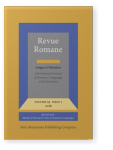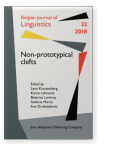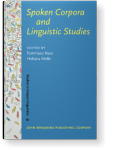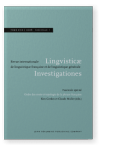Frédéric Sabio
List of John Benjamins publications for which Frédéric Sabio plays a role.
2018 On the syntax of spoken French: Government-Units and Utterance-Units Models of Discourse Units in Romance Languages, Borreguero Zuloaga, Margarita, Vahram Atayan and Sybille Große (eds.), pp. 6–29 | Article
This paper gives an account of the research carried out by the Groupe Aixois de Recherche en Syntaxe (GARS, Aix-Marseille University), in the field of spoken French description. Our framework explicitly states the need for two independent but related levels of grammatical description, namely the… read more
2018 The syntactic and discursive status of c’est comme ça que ( this is how ) in spoken and written French Non-prototypical clefts, Karssenberg, Lena, Karen Lahousse, Béatrice Lamiroy, Stefania Marzo and Ana Drobnjakovic (eds.), pp. 144–170 | Article
Several recent studies devoted to French clefts involving a pronominal/adverbial morpheme such as pour ça (for that), là (there), ainsi (like this), alors (then) and comme ça (like this) demonstrate that these are likely to behave in two distinct ways, one of them being somewhat… read more
2014 The notion of sentence and other discourse units in corpus annotation Spoken Corpora and Linguistic Studies, Raso, Tommaso and Heliana Mello (eds.), pp. 331–364 | Article
The notion of sentence – as it is defined in syntactic, semantic, graphic and prosodic terms – is not a suitable maximal unit for the prosodic and syntactic annotation of spoken corpora. Still, this notion is taken as a reference in many syntactic and prosodic annotation systems. We present here… read more
2006 L’antéposition des compléments dans le français contemporain: L’exemple des objets directs Ordre des mots et topologie de la phrase française, Gerdes, Kim et Claude Muller (dir.), pp. 173–182 | Article
In modern French, Noun Groups which fulfill a function of non prepositional complements (ie. direct objects) are traditionnally said to have a strictly fixed position after the verb, in contrast with other types of complements which have a freer distribution. Using data mostly drawn from spoken… read more



